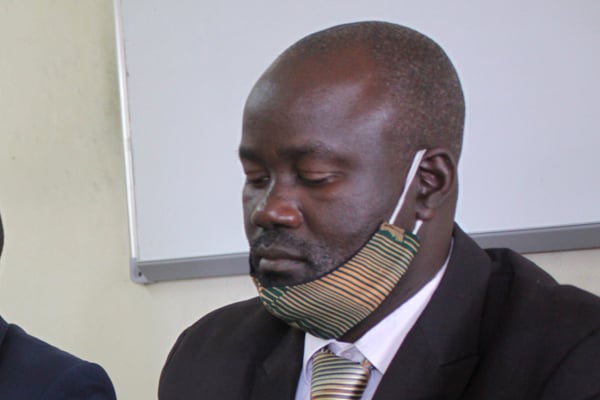Prime
Nagric: Return of interdicted officials brings new troubles

The executive director of the National Animal Genetic Resources and Data Bank (Nagric & DB) Dr Peter Beine is on the spot for allowing two interdicted officials to return to work before they are cleared of any wrongdoing in a case of abuse of office.
The executive director of the National Animal Genetic Resources and Data Bank (Nagric & DB) is on the spot for allowing two interdicted officials to return to work before they are cleared of any wrongdoing in a case of abuse of office.
Dr Peter Beine is also accused of reportedly incentivising an investigator attached to the State House’s Anti-Corruption Unit. It has been alleged that the Nagric executive director irregularly handed a job to the wife of the investigator.
The accusations are contained in a whistleblower’s July 7 letter to the ombudsman and the registrar of the Anti-Corruption Court.
Saturday Monitor has since seen a copy of a letter that was stamped as received by the Inspectorate of Government on July 29. Ms Munira Ali, the inspectorate’s spokesperson, confirmed receiving the petition.
According to the letter, seven Nagric officials, including Dr Charles Lagu, the former executive director; Mr Ezekiel Mukani, Dr Patrick Mawadri, Dr Anthony Wilfred Ntale, Mbabazi Taddeo, Dr Charles Psalms Ezati, and Dr Katali Benda appeared before the Anti-Corruption Court in August 2020, and were charged with, inter alia, abuse of office, negligence and causing financial loss.
The letter indicates that whereas the seven were interdicted, pending disposal of the cases that had been brought against them, Dr Beine had mysteriously reinstated two of them—Dr Ezati and Dr Katali.
“The public standing orders provide for, under Sections F-s 8(a-g), that every civil servant who is facing charges in court must be interdicted and such a person shall not exercise any official roles,” the letter reads in part, adding, “However, Dr Beine… with full knowledge of the case in progress under court, went ahead and redeployed Dr Ezati and Katali well aware that they were charged in court.”
The two officers were charged with abuse of office in a case related to approval of the direct procurement and supply of goods that was said to have led to a loss or theft of government funds totalling Shs1.3 billion.
The petitioner said Dr Katali was deployed at the head office to coordinate community breeding, while Dr Ezati was deployed at Kasolwe government farm to handle feeds.
“The two are back at work with full payments (salaries) and associated privileges,” the petitioner wrote.
Judiciary responds
Mr James Karemani, the Judiciary’s spokesperson, said he had no knowledge of the said petition. He added that whereas interdiction of officers under investigation is provided for under the Civil Service’s Standing Orders and Regulations, it is not for the courts to determine who should be interdicted or reinstated pending disposal of a case before any court.
Mr Karemani further revealed that the decision to interdict is an administrative matter at the discretion of the employer.
“When a matter comes to court, our duty is to handle it at court. The issues of interdiction and reinstatement are administrative. We do not go that side as court. Whether the person is not interdicted and remains in office as he works is not our business,” he said.
The petitioner, however, insists that Dr Beine should be held personally responsible for payments that have been made to the two officials.
“I pray that the payments and privileges illegally earned by the two be put against the account of the executive director as a financial loss and be recovered immediately … if he is found to have breached any other provisions of the law,” the petitioner prays.
The petitioner also wrote thus: “This is to request you to compel the executive director to enforce the interdictions provisions for [all] the employees facing criminal charges or open the veil [so that] all the staff get back their jobs.”
The petitioner is at the same time urging the Anti-Corruption Court to swing into action against Dr Beine, claiming that the decision to reinstate interdicted officials back to their jobs prior to their prosecution is an act of “contempt and undermining decisions of the court.”
Dr Beine speaks out
Dr Beine told Saturday Monitor earlier this week that the accusations against him had been raised by malicious members of staff. The Nagric executive director also hastened to add that he had provided the Inspectorate with all the appropriate answers.
“It (petition) was written by one of the malicious members of staff. I am sure you have seen many of that kind, but we provided our responses and the file was closed,” Dr Beine said.
Ms Munira, however, told Saturday Monitor that the Inspectorate was still scrutinising the petition.
“We received that matter (petition), but they are still reviewing it to see what action to take,” she said, adding, “Why they haven’t done anything on it, I cannot know.”
The petitioner in the same letter brings State House’s Anti-Corruption Unit under the microscope, accusing one of the investigators into the goings on at Nagric & DB—of taking advantage of his position to secure a job for his wife.
Saturday Monitor has independently learnt that the said investigator’s wife is employed in the transport unit of Nagric, a job which was secured at the peak of investigations that led to the eventual removal of Dr Lagu from office.
The petitioner argues that the employment of the investigator’s wife was a clear case of conflict of interest on the investigator, adding that it was an inducement aimed at directing the course of investigations.
“The recruitment of the wife of an investigations officer is total abuse and was based on a compromise to hide information and do selective prosecution,” the petitioner argues.
Ms Natasha Mariam Oduka, the deputy spokesperson of the State House’s Anti-Corruption Unit, declined to make a comment, arguing that she wasn’t conversant with the contents of the petition.




